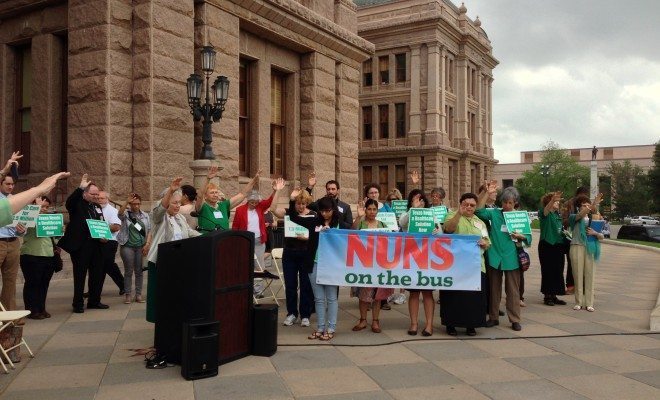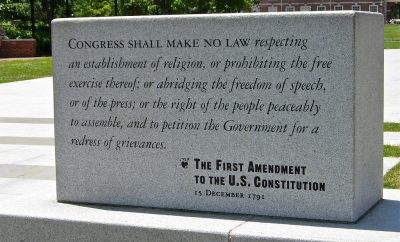
Blogs
How Pope Francis Can Shape Relationship Between Feminism and the Church
A group of Catholic nuns is denouncing the influence of big money in U.S. politics by conducting a 36-city tour across the country. The group, NETWORK, led by Sister Simone Campbell, kicked off its Nuns on a Bus campaign called “We the People, We the Voters” campaign. The group is advocating social justice through voter registration and expansion. The group has been the subject of criticism from other parts of the Catholic church, though, as part of an expanding internal conflict between Vatican authority and the Leadership Conference of Women Religious (LCWR).
The Nuns on the Bus began their campaigning in 2012 when they condemned income inequality in battle ground states. In 2013 they addressed immigration reform. It isn’t hard to see why some more conservative church authorities would reprimand Sister Campbell and her group. A report from the Religion News Service (RNS) describes an attack by Cardinal Gerhard Müller, Prefect of the Congregation of the Doctrine of the Faith, on the LCWR: “(Müller) said the sisters were focusing too much on social justice issues, such as caring for the poor and advocating for immigrants, and were too active in promoting healthcare reform.” In 2012, the LCWR was censured in a “doctrinal assessment” for exactly these actions. The Vatican isn’t alone in its criticism, though. The website CatholicCulture.org came out with a scathing article by its founder, Dr. Jeff Mirus, in August. “For decades, the LCWR has been vitiated by feminism, the New Age, Wicca, Modernism and just plain secularism,” Mirus writes.
By staying largely silent, Pope Francis has yet to be fully mired in the controversy. But a column in The Guardian expresses great disappointment in the Pope: “The really disheartening thing about the pope’s unwillingness to end the nuns’ censure – indeed, about his unwillingness to openly support them – is that his stated values are no different than the ones the Leadership Conference of Women Religious is being punished for carrying out,” writer Sadhbh Walshe noted. Cardinal Müller’s reproach of the LCWR is seemingly unregulated by Francis, who has long championed a greater church focus on social justice issues.
How is social justice work compatible with Catholic teachings, and what exactly is meant by “social justice”? For Sister Campbell, NETWORK, and the LCWR, social justice includes advocating for accessible health care, immigration reform and reduced corporate influence in elections. For Cardinal Müller and the Vatican, social justice advocacy is restricted to redressing abortion access.
If nothing else, this case illustrates the complex dynamics of religious authority and the dangers of generalizing when talking about religion. Two opposing interpretations of Catholic teachings on social justice are currently at war, and we wait on Pope Francis to make a statement. While it would be immature to demand that he take one side or another, it would be equally disappointing if he did not use his clout to make a meaningful statement on the matter. This case does more than just illustrate some different Catholic interpretations; it begs the question, why shouldn’t Pope Francis come out in support of the LCWR and activist nuns like Sister Campbell?
Francis also has the opportunity reject the exclusion of feminism from sanctioned church activity. Moreover, he has the opportunity to illustrate how feminism can support sanctioned church activity. Compatibility is the question here. How is feminism compatible with current Vatican doctrine and authority? The extent to which they are compatible can be suggested and advocated for, if not expressly dictated by, Pope Francis. If feminism has truly “vitiated” organizations like NETWORK and the LCWR, then it is also responsible for anti-torture campaigns, environmental activism, and advocacy of nuclear weapons restructuring.
From such an outsider’s perspective, it will never be my place to insist on this or that church doctrine. But Pope Francis, should he make a statement, as he has the opportunity to shape the relationship between feminism and the church.
—
Jake Ephros (@JakeEphros) is a native of Montclair, New Jersey where he volunteered for political campaigns from a young age. He studies Political Science, Economics, and Philosophy at American University and looks forward to a career built around political activism, through journalism, organizing, or the government.
Featured image courtesy of [TexasImpact via Flickr]








Comments